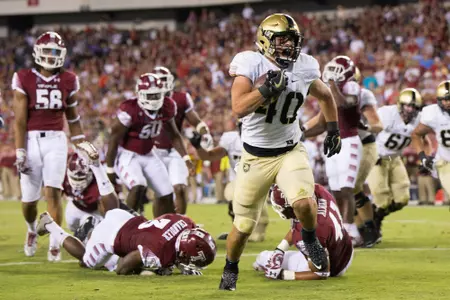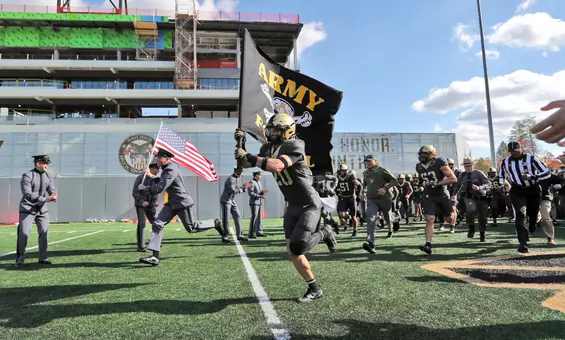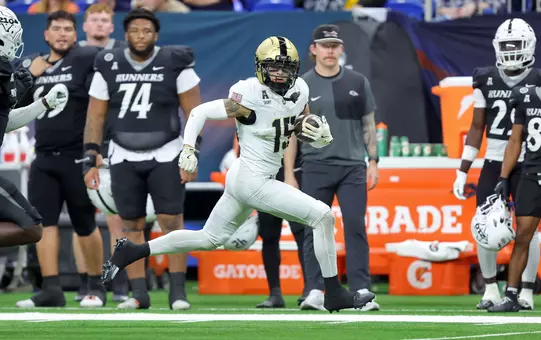Army West Point Athletics

Photo by: Bill Streicher-USA TODAY Sports
Feinstein's Findings: New Year, New Team
September 03, 2016 | Football
New York Times bestselling author, John Feinstein, will report on the Black Knights after each football game during the 2016 season. The weekly report will be posted to GoArmyWestPoint.com following each battle on the gridiron.
It's worth marking down the time and place, because when the weather turns cold this winter and West Point alums gather to talk about the 2016 football season, it might be the moment that old sages point to and say, 'that's when I knew we'd turned the corner.'
It was hardly flashy, not nearly as aesthetic pleasing as the runs Andy Davidson ripped off all night, but it was perhaps the most symbolically important moment in the 25 games that Jeff Monken has coached at Army.
After trailing Temple 10-7 at the break, The Black Knights had controlled most of the second half, coming out of the locker room and putting together exactly the kind of option football drive that wears opponents down and fills an offense with confidence: 12 plays, 77 yards, culminated by a three-yard run into the end zone by Davidson, the kid from nearby Allentown who grew up watching the Eagles and Temple play at Lincoln Financial Field.
Temple had answered with a field goal to make it 14-13 and now Army faced 4th-and-1 on the Owls 25-yard-line with the clock ticking towards 12 minutes left in the game. A year ago, en route to a 2-10 season filled with down-to-the-wire losses, 4th-and-short was Army's kryptonite. It had converted only 9-of-21 4th down attempts. If you asked Army people what their recurring vision of 2015 was, it was fumbled snaps and fourth down plays that ended in the Black Knights backfield.
Even so, there was no doubt Monken was going to go for it on the first fourth-and-short of the new season. On the first series of the game, Davidson had carried the ball on the first three plays and picked up a first down. The still-young offensive line had created holes all night.
So this was a chance to send a message—not so much to Temple---but to Army: new year, new team, different results.
Ahmad Bradshaw, who had coolly made correct decisions at quarterback all night, took the snap, ran a step to his left and squeezed into a hole big enough to allow him to pick up two yards—and the first down.
It was 9:40 on a comfortable night in Philadelphia. The game clock said 12:02. The contest was far from over, but a corner had been turned. Five plays later, Tyler Campbell took a pitch from Bradshaw, ran left, got a block from Jordan Asberry and sprinted into the end zone for a 21-13 lead. There were still some nervous moments left—when your record the previous five seasons is 14-46 you stay nervous until the clock is at :00—but there wasn't any doubt that this was a different Army team than those of the recent past.
The fourth down pick-up by Bradshaw was the symbol of a night to remember, but it was the play of the entire team that was encouraging—not encouraging in the, 'well, we played a good team tough,' way of last season—but encouraging in the way of 'we put themselves in position to win--and then won.'
Often, in rebuilding, that's the progression. You go from square one: figuring out how to compete; to square two: being competitive; to square three: competing AND winning. Army was competitive last year: seven of the 10 losses went to the wire. If you were looking for a symbolic moment last season, it was Xavier Moss, playing just his third game as a defensive back, being in perfect position to make what easily could have been a game-winning, pick-six interception on the final play from scrimmage in the Wake Forest game—and being unable to hang on to the ball. On the next play, the Deacons kicked a game-winning field goal.
Friday night, Army had three interceptions, including one by Marcus Hyatt on Temple's first drive when it looked like the Owls were going to roar down the field for a quick 7-0 lead. They did end up scoring the game's first touchdown, but the Black Knights came right back to tie the game. Army's three touchdown drives were 72-yards; 77-yards and 81-yards. There were NO turnovers.
That's worth repeating: NO turnovers—meaning the turnover margin was 3-0. A year ago, Army ranked 113th in the country in turnover ratio.
No one—starting with Monken—is going to claim that Army pitched a perfect game. Senior placekicker Mitchell Howard, in his first game as the team's kicker, missed two field goals—notably a 34-yarder early. Punter Nick Schrage, also making his debut, had his first punt blocked—although that may have been the result of faulty blocking more than anything else.
Still, when you are going to be in close games almost every week, special teams play is vital. The hope is that the two new kickers got the butterflies out in game 1 and will feel more comfortable this Saturday at home against Rice.
Monken kept his promise to play both Bradshaw and Chris Carter at quarterback, but stuck with Bradshaw after Carter's one series in the second quarter resulted in a three-and-out; a confusion time-out and the blocked punt.
Carter is almost certainly going to be needed to play: he's the better passer of the two quarterbacks. Bradshaw completed one pass Friday—very early—but that was in part because there was no need to pass. Those days are coming.
Overall though, the flaws were minor; the strengths major. Davidson, the converted linebacker, was a revelation at fullback and Darnell Woofolk, who had so impressed the coaches in pre-season, spelled him admirably. Army never found a capable replacement for Larry Dixon a year ago at the crucial fullback position. Now, it appears to have found two. Bradshaw was in control of his team all night and the slotbacks—notably Campbell—ran well AND blocked well.
And what about the defense? After giving up that first quarter touchdown, it never let the Owls into the end zone again. The defenders not only created the three turnovers, they had four sacks, shut down the running game and allowed Temple SIX points in the last three quarters—one of the field goals coming after the blocked punt deep in Army territory.
In all, a night to celebrate, but with a word of caution. Teams that haven't had success for a while can get caught up in that first blush. The cadets who play football will be pounded on the back and cheered as they move around the post this week. Their response should be a smile, a thank-you and this: "Beat Rice."
Saturday's game against a different group of Owls, one of those teams Army lost to at the buzzer a year ago, is the only home game in September and the only home game in the first five. One of the important steps to being a good team is to win your home games.
The celebration on Friday night was hard-earned and well-deserved. On Saturday, it's time to get back to work.
It's worth marking down the time and place, because when the weather turns cold this winter and West Point alums gather to talk about the 2016 football season, it might be the moment that old sages point to and say, 'that's when I knew we'd turned the corner.'
It was hardly flashy, not nearly as aesthetic pleasing as the runs Andy Davidson ripped off all night, but it was perhaps the most symbolically important moment in the 25 games that Jeff Monken has coached at Army.
After trailing Temple 10-7 at the break, The Black Knights had controlled most of the second half, coming out of the locker room and putting together exactly the kind of option football drive that wears opponents down and fills an offense with confidence: 12 plays, 77 yards, culminated by a three-yard run into the end zone by Davidson, the kid from nearby Allentown who grew up watching the Eagles and Temple play at Lincoln Financial Field.
Temple had answered with a field goal to make it 14-13 and now Army faced 4th-and-1 on the Owls 25-yard-line with the clock ticking towards 12 minutes left in the game. A year ago, en route to a 2-10 season filled with down-to-the-wire losses, 4th-and-short was Army's kryptonite. It had converted only 9-of-21 4th down attempts. If you asked Army people what their recurring vision of 2015 was, it was fumbled snaps and fourth down plays that ended in the Black Knights backfield.
Even so, there was no doubt Monken was going to go for it on the first fourth-and-short of the new season. On the first series of the game, Davidson had carried the ball on the first three plays and picked up a first down. The still-young offensive line had created holes all night.
So this was a chance to send a message—not so much to Temple---but to Army: new year, new team, different results.
Ahmad Bradshaw, who had coolly made correct decisions at quarterback all night, took the snap, ran a step to his left and squeezed into a hole big enough to allow him to pick up two yards—and the first down.
It was 9:40 on a comfortable night in Philadelphia. The game clock said 12:02. The contest was far from over, but a corner had been turned. Five plays later, Tyler Campbell took a pitch from Bradshaw, ran left, got a block from Jordan Asberry and sprinted into the end zone for a 21-13 lead. There were still some nervous moments left—when your record the previous five seasons is 14-46 you stay nervous until the clock is at :00—but there wasn't any doubt that this was a different Army team than those of the recent past.
The fourth down pick-up by Bradshaw was the symbol of a night to remember, but it was the play of the entire team that was encouraging—not encouraging in the, 'well, we played a good team tough,' way of last season—but encouraging in the way of 'we put themselves in position to win--and then won.'
Often, in rebuilding, that's the progression. You go from square one: figuring out how to compete; to square two: being competitive; to square three: competing AND winning. Army was competitive last year: seven of the 10 losses went to the wire. If you were looking for a symbolic moment last season, it was Xavier Moss, playing just his third game as a defensive back, being in perfect position to make what easily could have been a game-winning, pick-six interception on the final play from scrimmage in the Wake Forest game—and being unable to hang on to the ball. On the next play, the Deacons kicked a game-winning field goal.
Friday night, Army had three interceptions, including one by Marcus Hyatt on Temple's first drive when it looked like the Owls were going to roar down the field for a quick 7-0 lead. They did end up scoring the game's first touchdown, but the Black Knights came right back to tie the game. Army's three touchdown drives were 72-yards; 77-yards and 81-yards. There were NO turnovers.
That's worth repeating: NO turnovers—meaning the turnover margin was 3-0. A year ago, Army ranked 113th in the country in turnover ratio.
No one—starting with Monken—is going to claim that Army pitched a perfect game. Senior placekicker Mitchell Howard, in his first game as the team's kicker, missed two field goals—notably a 34-yarder early. Punter Nick Schrage, also making his debut, had his first punt blocked—although that may have been the result of faulty blocking more than anything else.
Still, when you are going to be in close games almost every week, special teams play is vital. The hope is that the two new kickers got the butterflies out in game 1 and will feel more comfortable this Saturday at home against Rice.
Monken kept his promise to play both Bradshaw and Chris Carter at quarterback, but stuck with Bradshaw after Carter's one series in the second quarter resulted in a three-and-out; a confusion time-out and the blocked punt.
Carter is almost certainly going to be needed to play: he's the better passer of the two quarterbacks. Bradshaw completed one pass Friday—very early—but that was in part because there was no need to pass. Those days are coming.
Overall though, the flaws were minor; the strengths major. Davidson, the converted linebacker, was a revelation at fullback and Darnell Woofolk, who had so impressed the coaches in pre-season, spelled him admirably. Army never found a capable replacement for Larry Dixon a year ago at the crucial fullback position. Now, it appears to have found two. Bradshaw was in control of his team all night and the slotbacks—notably Campbell—ran well AND blocked well.
And what about the defense? After giving up that first quarter touchdown, it never let the Owls into the end zone again. The defenders not only created the three turnovers, they had four sacks, shut down the running game and allowed Temple SIX points in the last three quarters—one of the field goals coming after the blocked punt deep in Army territory.
In all, a night to celebrate, but with a word of caution. Teams that haven't had success for a while can get caught up in that first blush. The cadets who play football will be pounded on the back and cheered as they move around the post this week. Their response should be a smile, a thank-you and this: "Beat Rice."
Saturday's game against a different group of Owls, one of those teams Army lost to at the buzzer a year ago, is the only home game in September and the only home game in the first five. One of the important steps to being a good team is to win your home games.
The celebration on Friday night was hard-earned and well-deserved. On Saturday, it's time to get back to work.
Players Mentioned
Army at UTSA Game Highlights
Sunday, November 30
This Week in Army Football: UTSA
Tuesday, November 25
This Week in Army Football: Tulsa
Tuesday, November 18
Army Rugby vs Navy 11/15/25 (KnightVision Free Live Sports)
Saturday, November 15













